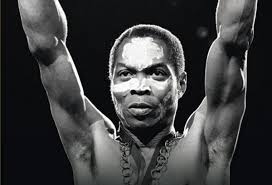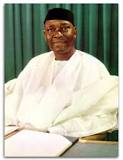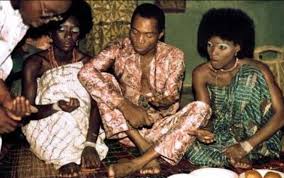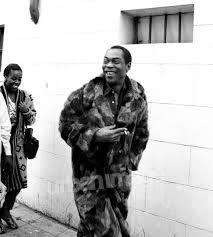The following recollections of several memorable connections Randy Weston made with the legendary Nigerian bandleader Fela Kuti are excerpted from Chapter 8 of African Rhythms, the autobiography of Randy Weston (Composed by Randy Weston, Arranged by Willard Jenkins; 2010, Duke University Press).
Fela Ransome Kuti

Fela is the bravest, most courageous musician I’ve ever met in my life. He lived in a country which was controlled at that time by the military government, and military rule is always hard core. As I mentioned, I’d actually met Fela on that first 1961 trip and was happy to see him this time; but by this time he was becoming an increasingly larger figure in Nigerian life. Remember, 1961 was right after many of these African nations had just gained their independence from colonial rule, and we had met President Azikiwe that first trip. He was a hero of the Nigerian liberation from the British. He was a beautiful man, very cultured, very educated. When we had that dinner at his house on that ’61 trip they served a ton of food. At one point Azikwe said to me “Mr. Weston, I don’t think you’ve had this kind of food before.” I said “I’m sorry sir, but I grew up with this kind of food.” And I told him about my father being from Jamaica, Panama, and about the okra, yam, peas & rice and all that stuff I had grown up on which is straight out of Africa. After Azikiwe came the military government and they had all those coups and killings and Nigeria just went crazy.

Nigerian President Nnamdi Azikiwe
Fela was also an educated man, who was forever in opposition to these military governments, so he became a thorn in their sides because the people really loved his music; and as a result he became a global superstar. I don’t know how Fela got such power, but I do know his mother was a very famous politician, a real revolutionary. By the time I returned to Nigeria in 1977 Fela had developed his own village right in the city of Lagos. Also by this time Fela was making recordings and he had formed his own organization called Afro Beat. That band Afro Beat was the most popular group in all of Africa, except for the Congo because in Congo they have the strongest rhythms on the continent.
Fela was growing ever more powerful among the people, saying stuff like he wanted to be president of Nigeria. He was constantly insulting the military government: calling them fascists, murderers, assassins, writing songs about them… They put him in jail a number of times. When I visited him and went through his village there were brothers all around with stands full of reefer smoke. When Fela walked through there he was the chief.
Fela’s mother was also quite an impressive woman. An illustration of that was an incident I heard about where she organized some opposition to one of the Nigerian chiefs. Somehow this cat wasn’t doing the right thing; I don’t remember all the details. But whatever the case, what he was doing wasn’t correct with the women. Fela’s mother was so powerful that she gathered a thousand women to march on this chief’s palace. And if you can picture this, they stood in front of this chief and began disrobing. This scene was too strong for that chief and he split right outta there. Can you imagine that, standing there looking at a thousand naked women. Whatcha gonna do behind that?
FESTAC ’77… hanging with Fela again
Another great trip to Africa came after I had my first opportunity to tour the continent with my band, but that’s another story entirely. In 1977 I traveled there on my own to join a delegation of artists and great thinkers at the FESTAC event. FESTAC ’77 was actually the second Black and African Festival of Arts and Culture. The organizer’s idea was to bring over black representatives of the global arts and culture community from across Africa and the diaspora, including places as far away as Australia, which sent some Aborigine artists.
Once again I traveled to Lagos, which by that time was a bit different place than it was when I was there in the 1960s. For one thing cars had literally taken over the place and the traffic was horrendous around the clock. The ancient country of Ethiopia, which I still haven’t visited, is much older than Nigeria and except for an incursion by the Italians Ethiopia basically remained free of colonialism. Ethiopia was the host of Festac ’77, even though Nigeria was the site. The Nigerian government reportedly put up huge amounts of oil money to stage this event. The whole idea is that we are one African people, that was the goal of FESTAC. No matter if we’re in Mississippi or Havana, or Australia, or wherever; that was the whole point of the event.
They invited about 20,000 artists from across the globe. I never counted them but that was the official number. I only wound up playing once, at least officially, though I did jam with Fela; but we’ll get to that in a minute. Sun Ra was there and he played once. There was so much great artistry at this conference that you didn’t need to play more than once. Representatives from the entire black world organized this thing. They hosted colloquiums throughout FESTAC on every thing from education to health to music, all things involved with African people. It was designed to develop a sense of global unity. FESTAC lasted one month, throughout January. Each country sent groups and usually the groups would stay one or two weeks, then other groups would come. I stayed most of the month because I had come individually on my own; I didn’t come with the American delegation because I was living in France at the time.
One of the artists there was a dancer named Percy Boyd from Trinidad, the husband of the great dancer Pearl Primus. He was a fantastic artist himself and a very brilliant guy. The scene was kind of chaotic in a way, with a lot of confusion over transportation. But Percy was hooked up; he had a bus and a chauffer. Once he did his two weeks with his dance company and was ready to split he said “Randy, do you want this bus. I’ll give you this bus and this is your chauffer, he’ll do whatever you want him to do.” So I had this big bus and a chauffer like some kind of big shot – and meanwhile some of these visiting ministers couldn’t even find any transportation!
They had houses for the artists, not hotels. Each country had its own housing: Ethiopia is here, Mali is here, Brazil is over there, Cuba is there, Libya is there, Tunisia, Morocco… it was an amazing scene. Plus you can imagine all the music; it was so powerful it was one of the most incredible experiences of my life.
The array of folks there was also incredible. For example I’d have breakfast and my tablemates might be Louis Farrakhan, Stevie Wonder, Queen Mother Moore, and a heavy Sufi master named Mahi Ismail. Imagine me hanging out with those cats! Stevie and I actually managed to stay in a hotel. When he arrived Stevie came into the hotel with his guitar, walked in the lobby, sat down and started singing and playing his guitar; that’s the first thing he did when he got there!
The Nigerians had built a special theatre for this event, but the two brand new Steinway pianos and one Bosendorfer they had purchased were waiting at the airport hung up in customs apparently. Long story short the pianos didn’t arrive until the day of the concert. I was supposed to play first opposite some Ethiopian musicians. But they were late getting the piano there and I wound up playing second, on a new piano that had never been touched before!
Fela was one of the main people I wanted to see while there, and like many African musicians he had his own club called The Shrine, just opposite his village in Lagos. Fela’s club was really big, it must have held about 1,000 people and the night I went there it was packed. When I got to Fela’s village he was sitting in a corner, holding court and eating away. I’m stepping through all kinds of women, all surrounding this dude. It was quite a scene. He saw me and said “Randy, come on and have some food.” We talked awhile then it was time for him to perform, so he put on his stage costume and we were stepping around all these women to get outside. As we’re walking through his village it was obvious Fela was like a king to these people.

We entered the Shrine and this place, along with Bobby Benson’s joint, really became my inspiration for wanting to open up my own club. Fela got his band together for the performance and he calls me over and says “Randy, you sit there.” He had an English film crew capturing his every move. He started by playing this little rhythm on the piano, then the band came in and he grabbed his saxophone. The rhythm was totally infectious, but you have to hear it live, you have to be where people are dancing to this band to fully appreciate this groove. At one point in his performance Fela grabbed the mike and said “Ladies and gentlemen, I want you to meet my brother from America,” and they brought me onstage. So we jammed a bit. Next thing I know he’s talking on the mike again and he’s got me by the hand and he’s cursing out the military – and there were military guys in the club! I wanted to get the hell off that stage with a quickness ‘cause those cats don’t play! Man, Fela was fearless, but I was sweatin’… what this guy didn’t call the government… and he wouldn’t let go of my hand! The people were cheering him on!

One week later, after we had all left, the soldiers raided Fela’s village and destroyed the place. They threw his mother out of a window, beat him up and took him to prison, and raped all his girls. But when he came out of jail Fela was the same, still defiant. He said “I’m the president of Africa;” he was against all that stuff that was in opposition to the true Africa, he was incredible.
